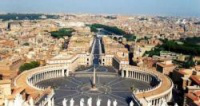Expert discusses Vatican's recent banking difficulties

view from St Peters - pic ICN
The new Director of the Vatican’s Financial Information Authority (AIF), Rene Bruelhart, has spoken about moves by the Bank of Italy to block electronic cash and payment machines.
In an interview published by the Italian daily Corriere della sera and translated by the Vatican press office Mr Bruelhart said: “I’m surprised by the measures taken by the Bank of Italy blocking all the credit card services of Deutsche Bank in the Vatican.
"In July, the Holy See passed the third round evaluation of the Moneyval Committee of the Council of Europe with a ‘good’ report card, passing 9 of 16 ‘core and key’ recommendations. So the Vatican was not subject to any special measures for monitoring money laundering, neither by Moneyval nor by any other international body.
"We don’t have problems with other European countries. On the contrary, we have close collaboration. No other country in the world has adopted similar measures. I repeat, therefore, that I’m truly surprised.”
Rene Bruelhart, a 40-year old from Switzerland, and one of the top experts in the world in anti-money laundering, since November the director of AIF (Financial Information Authority) for the Holy See, responds to an official note which appeared prominently last Thursday on the website of the Bank of Italy under the headline 'Information and Explanations,' in which the motives for blocking the POS (Point of Sales) are given. The note, citing the Moneyval report, maintains that “the presence of an effective anti-money-laundering regime had still not been proved.”
“The year 2012 was one of verifying and adjusting the Vatican legislation to international and European Community norms, in terms of money laundering and financing terrorism,” the Adjunct Promoter of Justice Pierfrancesco Grossi said during the opening of the judicial year in the Vatican, in front of the Minister of Justice, Paola Severino and the First President of the Court of Cassation, Ernesto Lupo.
"The result of the evaluation – carried out in the course of about a year – that is, the Report on Vatican City, was put before the Plenary Assembly of Moneyval on July 4, which approved it in all of its parts, deeming the process in adjusting to international standards satisfactory and credible: the Holy See was not subjected to any special monitoring measure, neither by Moneyval nor by any other international body. A jurisdiction is subject to a 'special' monitoring measure when it fails to pass 10 or more of the essential recommendations, known as “core and key” recommendations. On this basis, with the Holy See having passed nine of the 'core and key' recommendations, Moneyval affirmed that the Holy See has a system of preventing and fighting money laundering and the financing of terrorism, equivalent to and recognized at the international level.
He said: "..the Holy See has implemented the 'Third EU Directive' relating to anti-money-laundering and terrorist financing in the same way as all other member states of the European Union. I also point out that, for the Moneyval evaluators, in some cases the Holy See adopted a superior and more severe standard than the one requested by the directive."
He added that there were't with other European countries, saying: "on the contrary, there’s close collaboration with European countries. In this context I’d like to mention that in 2012 AIF entered into Memoranda of Understanding with two European countries (editor’s note: Belgium and Spain) for the international exchange of information and has begun negotiations with more than 20 countries. We’ve also started the process of entering the 'Egmont Group' (the international network for the exchange of confidential financial information) in which more than 130 countries participate, precisely with the goal of further developing that work, and strengthening international cooperation. AIF also has close collaboration with similar Authorities in various countries in the European Union. So I’m truly surprised by the measures taken by the Bank of Italy. No other country in the world has adopted similar measures."
Rene Bruelhart said the AIF has also started "close and direct relations" with the competent authorities in the United States.
The Bank of Italy claims the credit card services were blocked in relation to anti-money-laundering norms, but that this is not the only problem. They say the simplified controls with 'equivalent' countries can take place 'only under the condition that the non-EU country has adequate banking regulations systems of vigilance that allow for exchange of information between the respective authorities.' Mr Bruelhart commented: "At the present time in the Vatican City State there is a relevant financial institution, that is, the IOR, a public and not a private or banking institution. So it doesn’t seem right to talk about a 'banking sector,' because that’s not what it is. The reality is that, considering the particular nature of the Vatican City State, adequate measures have been adopted for vigilance, prevention, and fighting money laundering and financing terrorism. AIF also has the task of a supervisory Authority and is fully committed in international cooperation also in this area, including the exchange of information with other states, among them those in Europe."
He concluded: ".... the Holy See is committed to adopting further measures in the coming months, because as you know, fighting money laundering is always a 'work in progress.'."















